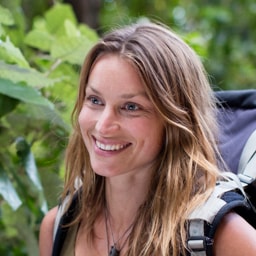In her new book, Miriam Lancewood explores the relationship between humans and nature. Here, she tells us about the travel that changed her
Miriam Lancewood has not lived a conventional life. She and her husband, Peter, spent seven years in the wilderness of New Zealand during which time they survived by hunting wild animals and foraging while sleeping in a tent and cooking on an open fire. Since then, Miriam has walked across Europe and written three books about her experiences in nature.
Miriam was born in the Netherlands in 1983. After finishing university, she worked for a year in Zimbabwe before travelling to India where she met Peter – an encounter that would change their lives forever.
After journeying for years through the great ranges of Asia, they eventually found themselves in Peter’s native New Zealand. In 2010, they sold or gave away nearly all of their possessions and struck out on a bold off-grid experiment.
For seven years, Miriam and Peter lived a nomadic life in the wilds of the New Zealand Alps. After returning to civilisation, they walked across Europe to Turkey with a tent and little else before finally settling down in Bulgaria.
Miriam’s 2017 memoir, Woman in the Wilderness, became an international bestseller and was translated into five languages. The sequel, Wild at Heart, was released in 2020.
Here, she tells us about Wilder Journeys, her new book in which an extraordinary collection of authors share their own profound experiences in nature.
Your new book, Wilder Journeys, looks at mankind’s relationship with nature. Why is this important?
If we look at the evolution of mankind we see that humans have moved from using instinct to relying on more and more complex and abstract thinking. So much so that we live in ‘hyper-reality’ and are barely aware that we have a body. The physical world and our physical body have become almost irrelevant. Our digits in the bank and social media status are much more important to us.
Since our body is irrelevant, it’s easy to forget we need more sleep, less stress, to eat healthier or breathe better air. Since the natural world is irrelevant, it’s easy to forget (and sometimes even hard to notice) that we destroy the soil and the forest and have polluted the rivers, oceans and air.
If we reconnect with our body, we begin healing. If we reconnect with our environment we stop the destruction. The two are entirely linked. We…
Click Here to Read the Full Original Article at Atlas & Boots…
